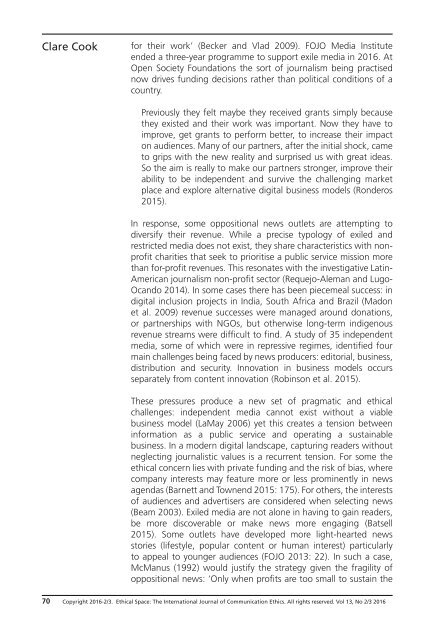Beyond clickbait and commerce
v13n2-3
v13n2-3
Create successful ePaper yourself
Turn your PDF publications into a flip-book with our unique Google optimized e-Paper software.
Clare Cook<br />
for their work’ (Becker <strong>and</strong> Vlad 2009). FOJO Media Institute<br />
ended a three-year programme to support exile media in 2016. At<br />
Open Society Foundations the sort of journalism being practised<br />
now drives funding decisions rather than political conditions of a<br />
country.<br />
Previously they felt maybe they received grants simply because<br />
they existed <strong>and</strong> their work was important. Now they have to<br />
improve, get grants to perform better, to increase their impact<br />
on audiences. Many of our partners, after the initial shock, came<br />
to grips with the new reality <strong>and</strong> surprised us with great ideas.<br />
So the aim is really to make our partners stronger, improve their<br />
ability to be independent <strong>and</strong> survive the challenging market<br />
place <strong>and</strong> explore alternative digital business models (Ronderos<br />
2015).<br />
In response, some oppositional news outlets are attempting to<br />
diversify their revenue. While a precise typology of exiled <strong>and</strong><br />
restricted media does not exist, they share characteristics with nonprofit<br />
charities that seek to prioritise a public service mission more<br />
than for-profit revenues. This resonates with the investigative Latin-<br />
American journalism non-profit sector (Requejo-Aleman <strong>and</strong> Lugo-<br />
Oc<strong>and</strong>o 2014). In some cases there has been piecemeal success: in<br />
digital inclusion projects in India, South Africa <strong>and</strong> Brazil (Madon<br />
et al. 2009) revenue successes were managed around donations,<br />
or partnerships with NGOs, but otherwise long-term indigenous<br />
revenue streams were difficult to find. A study of 35 independent<br />
media, some of which were in repressive regimes, identified four<br />
main challenges being faced by news producers: editorial, business,<br />
distribution <strong>and</strong> security. Innovation in business models occurs<br />
separately from content innovation (Robinson et al. 2015).<br />
These pressures produce a new set of pragmatic <strong>and</strong> ethical<br />
challenges: independent media cannot exist without a viable<br />
business model (LaMay 2006) yet this creates a tension between<br />
information as a public service <strong>and</strong> operating a sustainable<br />
business. In a modern digital l<strong>and</strong>scape, capturing readers without<br />
neglecting journalistic values is a recurrent tension. For some the<br />
ethical concern lies with private funding <strong>and</strong> the risk of bias, where<br />
company interests may feature more or less prominently in news<br />
agendas (Barnett <strong>and</strong> Townend 2015: 175). For others, the interests<br />
of audiences <strong>and</strong> advertisers are considered when selecting news<br />
(Beam 2003). Exiled media are not alone in having to gain readers,<br />
be more discoverable or make news more engaging (Batsell<br />
2015). Some outlets have developed more light-hearted news<br />
stories (lifestyle, popular content or human interest) particularly<br />
to appeal to younger audiences (FOJO 2013: 22). In such a case,<br />
McManus (1992) would justify the strategy given the fragility of<br />
oppositional news: ‘Only when profits are too small to sustain the<br />
70 Copyright 2016-2/3. Ethical Space: The International Journal of Communication Ethics. All rights reserved. Vol 13, No 2/3 2016


